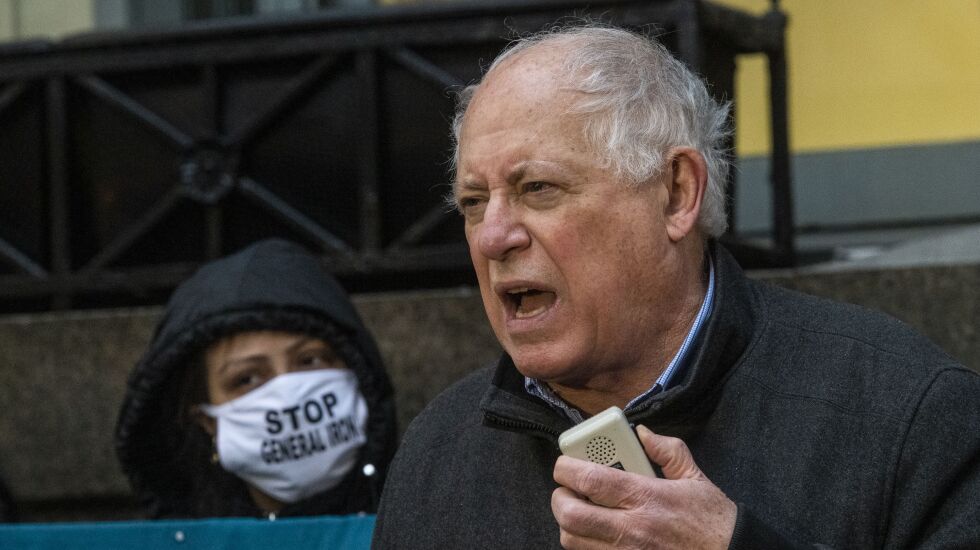
Former Gov. Pat Quinn, who is considering a run for mayor, called on City Hall to release a watchdog report on the 2020 botched implosion of a power plant smokestack that left Little Village smothered in dust.
Quinn wanted to hand-deliver a letter to Mayor Lori Lightfoot and Corporation Counsel Celia Meza at City Hall Monday afternoon asking for the public release of an investigative report that was completed last year but which has been kept secret. The City Council and Little Village community activists have made similar demands.
The former governor, however, got no further than the lobby, being denied permission to go upstairs because he didn’t have an appointment. Someone came down to the lobby to get the letter. Quinn then talked to reporters in the lobby for a few minutes.
There, he reiterated that it was crucial to release the information to the public “so everyone can figure out what went wrong, what did the city do wrong, so we don’t ever have that happen again.”
At issue is an investigation done by the city’s Office of Inspector General that found three city officials should be disciplined, including one possible firing, for neglecting to safeguard the community when an almost 400-foot chimney at the former Crawford coal-burning power plant came crashing down, covering the Little Village neighborhood in a giant cloud of dust Easter weekend in April 2020. No employees were fired for the debacle but one public health official received a written reprimand, according to a short summary of the report released in January.
City officials have said that, by law, they cannot release the full report. Quinn disputes that assertion.
In his letter, Quinn said state and city law is clear: the city can release such reports “in cases which implicate a possible violation of criminal law and are a matter of high public interest.”
The letter also said under the state’s constitution, “each person has the right to a healthful environment and each person may enforce this right against any party, governmental or private, through appropriate legal proceedings.”
In an interview, Quinn said he is still “exploring” a possible run for mayor. The report should be released, he said, because “when that’s done, people will see how wrong the city operated in the run-up to the demolition” of the Crawford plant.
“I don’t think there’s any justification for the mayor and the corporate counsel hiding the full inspector general report,” Quinn said.
The move also signals that, if Quinn runs, the former Democratic governor will campaign on environmental protection, especially as it relates to low-income communities of color already suffering from poor air quality, such as Latino-majority Little Village. The Crawford implosion followed protests from residents who didn’t want the former coal plant site redeveloped into a million-square-foot warehouse for Target, bringing in hundreds of diesel trucks a day.
Quinn said he believes the city should reinstate the Department of Environment, which was dismantled under Mayor Rahm Emanuel in a cost-savings move. Lightfoot campaigned on re-establishing an environmental department but, once in office, said the city couldn’t afford it.
The mayor is running for re-election next year and a campaign spokeswoman deferred comment to City Hall. Lightfoot administration officials didn’t immediately respond to requests for comment.
Earlier this month, the Sun-Times reported a city official had warned before the implosion that, without proper planning, it could cause “almost cataclysmic” harm to the community.
Quinn referenced the article in his letter, saying “the warnings and safeguards were completely ignored.” City officials have disputed such claims.
“This serious environmental catastrophe is a matter of high public interest and a possible criminal law violation in light of the city’s grossly negligent or willful failure to to properly take responsibility for protecting the health and safety of the residents and property of Little Village before the Crawford smokestack demolition,” Quinn wrote in his letter.
Quinn’s letter is also an open-records request under the Illinois Freedom of Information Act. The Sun-Times previously filed an open-records request with the city for the report. That request was rejected last year.
Brett Chase’s reporting on the environment and public health is made possible by a grant from The Chicago Community Trust.







